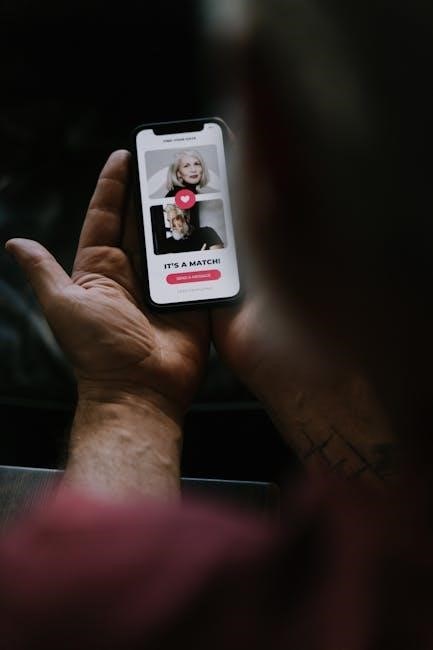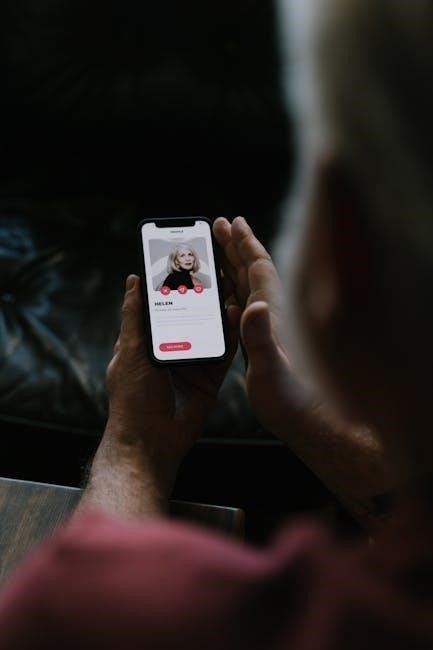guide on how to fail at online dating
Online dating failure often stems from unrealistic expectations, poor profiles, and neglecting feedback. Many users overlook red flags or rely on clichés, leading to unfulfilling matches and missed opportunities.
1.1. Why People Fail at Online Dating
Many individuals fail at online dating due to unrealistic expectations about potential partners. They often seek perfection rather than compatibility, leading to disappointment. Poor profile creation is another major issue, as low-quality images or generic bios fail to attract meaningful connections. Additionally, some users neglect to learn from feedback, repeating the same mistakes repeatedly. Ignoring red flags, such as inconsistent behavior or lack of effort, can also lead to unsuccessful matches. Furthermore, relying on clichés or generic openers in messages reduces the chance of standing out. These factors combined create a cycle of unfulfilling interactions, making it difficult to achieve lasting relationships. Understanding these pitfalls is crucial for avoiding common traps in the online dating world.

1.2. Common Pitfalls in Online Dating
One of the most common pitfalls in online dating is using low-quality or misleading profile pictures. This can lead to disappointment or mistrust when meeting in person. Another mistake is writing a generic or unengaging bio, which fails to showcase personality or interests. Many users also fall into the trap of being overly passive, such as not initiating conversations or responding inconsistently. Additionally, relying on clichéd openers like “Hey” or “What’s up?” can make it difficult to stand out. Some individuals also neglect to tailor their messages, sending the same generic greeting to multiple matches. These habits often result in unfulfilling interactions and a lack of meaningful connections. By avoiding these common mistakes, users can increase their chances of success in the online dating world.

Strategies to Ensure Failure
To ensure failure, use unflattering photos, write vague bios, and send generic messages. Avoid personalization and ignore matching criteria to maximize unfulfilling connections and missed opportunities online.
2.1. Using the Wrong Profile Pictures
Profile pictures are the first thing potential matches see, making them crucial for initial impressions. To ensure failure, use low-quality, poorly lit images that fail to showcase your best features. Avoid smiling or appearing approachable, as this can deter interest. Instead, opt for photos with distracting backgrounds, unflattering angles, or excessive filters that hide your true appearance. Using group photos where you’re barely recognizable or inappropriate images that raise red flags can also hinder success. Neglecting to update your photos or using outdated images from years ago further reduces your chances of attracting genuine connections. By prioritizing visuals that repel rather than attract, you can effectively minimize matches and opportunities for meaningful interactions online.
2.2. Writing a Poor Bio
A poorly crafted bio is a surefire way to sabotage your online dating efforts. To fail, use generic phrases like “I love adventure” or “I’m funny,” without providing specific examples or personality. Avoid mentioning unique hobbies, interests, or what you’re looking for in a partner, as this makes your profile indistinguishable from others. Including too much negativity, such as “I’m only here because my friends made me,” can repel potential matches. Overly long bios filled with unnecessary details or overly short, lazy descriptions can also turn people away. Neglecting to proofread or using excessive slang can make you appear unprofessional or uninterested. By failing to showcase your authentic self or stand out, you ensure your bio will fail to attract meaningful connections.

Psychological Factors Leading to Failure
Unrealistic expectations and ignoring red flags are key psychological pitfalls. Idealizing partners or disregarding warning signs can lead to dissatisfaction and unsuccessful matches, undermining online dating efforts.
3.1. Having Unrealistic Expectations
Unrealistic expectations are a major psychological barrier to success in online dating. Many users idealize potential partners, expecting perfection in appearance, personality, or lifestyle, which is rarely achievable. This mindset often leads to disappointment when reality fails to meet these lofty standards. For instance, profiles showcasing only the best photos or most charming traits can create unrealistic images of others. Similarly, some individuals believe online dating should yield immediate results, leading to frustration when connections take time to develop. These unrealistic expectations can prevent meaningful relationships from forming, as users may overlook compatible matches in favor of an unattainable ideal. Research by EJ Finkel highlights how such expectations can undermine satisfaction and lead to chronic dissatisfaction in online dating experiences. This mindset is a key factor in why many struggle to find lasting connections online.

3.2. Ignoring Red Flags
Ignoring red flags is a common psychological pitfall that leads to failure in online dating. Many users overlook inconsistencies in profiles, negative behavior, or evasive answers, hoping to find a connection. This tendency often stems from optimism or a desire to see the best in others. However, ignoring red flags can lead to mismatched values, unhealthy dynamics, or even unsafe situations. For instance, someone might dismiss a partner’s reluctance to share personal details or frequent cancellations, only to face bigger issues later. Research shows that ignoring red flags can result in unfulfilling relationships or emotional distress. By downplaying warning signs, individuals set themselves up for disappointment and reinforce the likelihood of failing at online dating. This behavior not only wastes time but also fosters frustration and disillusionment with the process.

Behavioral Mistakes

Behavioral mistakes, such as being inactive on dating apps or using clichéd openers, significantly hinder success. These actions often lead to missed opportunities and unengaging interactions.
4.1. Being Inactive on Dating Apps
Consistent inactivity on dating apps is a surefire way to fail. Algorithms often prioritize active users, so neglecting to swipe, match, or message leads to reduced visibility and fewer opportunities. Many users mistakenly believe that creating a profile is enough, but without engagement, potential matches may overlook or forget about them. Additionally, infrequent use signals a lack of seriousness or interest, discouraging others from initiating contact. Regular interaction not only boosts profile rankings but also increases the likelihood of meaningful connections. By remaining inactive, users essentially sabotage their chances of success in the competitive online dating landscape.

4.2. Using Clichés and Generic Openers
Relying on clichéd phrases like “Hey, how are you?” or “What’s up?” is a recipe for failure in online dating. These generic openers lack originality and fail to spark meaningful conversations. They come across as lazy and insincere, making it harder to stand out in a crowded dating pool. Many users overlook the importance of personalization, which is key to grabbing attention. By using uncreative and overused lines, you risk being ignored or dismissed as just another face in the crowd. To truly fail, stick to these tired phrases and avoid showing genuine interest or effort in getting to know someone. This approach ensures your conversations remain superficial and unengaging, driving potential matches away.

Final Tips for Guaranteed Failure
To ensure failure, persist in using ineffective strategies and ignore feedback. Avoid learning from mistakes and stick to unproductive habits consistently for disappointing results.
5.1. Chasing the Wrong Type

Chasing the wrong type is a guaranteed path to failure in online dating. Many users obsess over individuals who don’t align with their values or lifestyle, ignoring compatibility. This fixation often leads to unfulfilling relationships or repeated rejections. Rather than seeking someone who shares their interests, they prioritize superficial traits, such as looks or social status, over genuine connection. This mindset fosters disappointment and frustration. Additionally, pursuing the wrong type distracts from potential matches who could offer meaningful partnerships. By focusing on the wrong criteria, users set themselves up for emotional dissatisfaction and a lack of lasting results. This approach ensures that their dating journey remains unsuccessful and draining.
5.2. Ignoring Feedback and Learning
Ignoring feedback and refusing to learn is a guaranteed way to fail at online dating. Many users neglect to seek advice on their profiles or communication styles, missing opportunities to improve. They fail to reflect on why certain conversations fizzle out or why matches don’t lead to dates. This lack of self-awareness prevents growth, causing repetitive mistakes. Instead of adapting, they blame the platform or others, ensuring their strategies remain ineffective. Without learning from feedback, users cannot refine their approach, leading to continued disappointment. This stubbornness guarantees that their online dating experience will remain unproductive and frustrating. By ignoring feedback, they sabotage their chances of success, solidifying their place in the cycle of failure.
